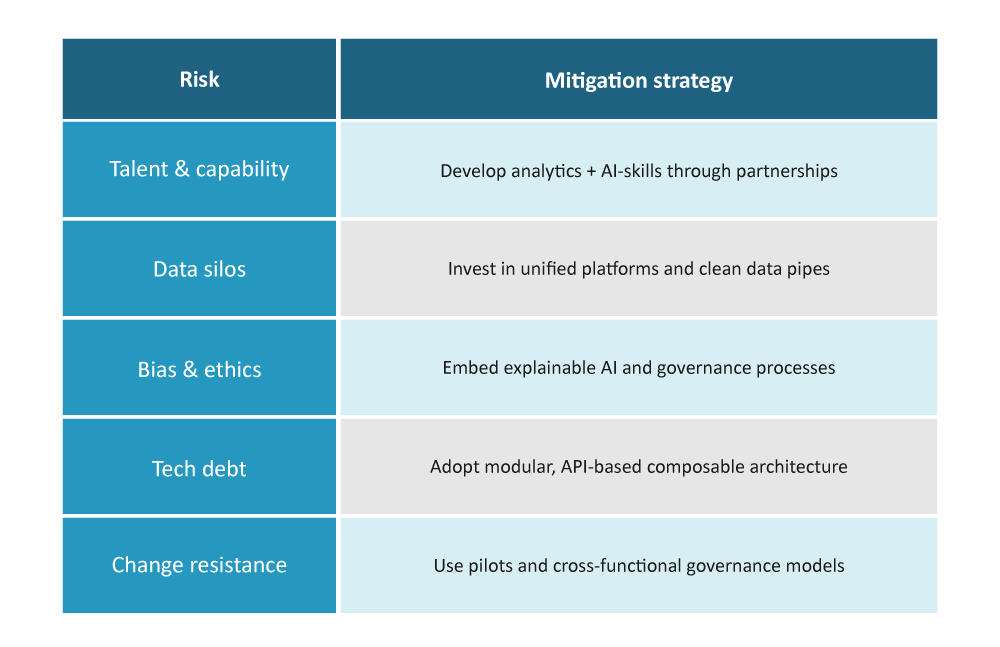The role of artifical intelligence in ecommerce innovation in 2025

Highlights:
- AI has become a core enabler of speed, personalization, and operational agility, helping brands meet rising consumer expectations and build long-term resilience.
- Transformational use cases like smart logistics, hyper-personalization, and automated pricing are driving measurable gains in revenue, efficiency, and customer retention.
- Retail leaders such as Walmart and Caleres are scaling AI across critical functions, from inventory management to enhanced search and UX — proving real ROI.
- Strategic implementation and governance frameworks are essential, ensuring that AI adoption is outcome-focused, ethically sound, and built for scale.
The e-commerce landscape in 2025 is being redefined by data-driven technologies. Forward-thinking businesses now turn to artificial intelligence in ecommerce and machine learning in ecommerce to build resilience, anticipate consumer needs, and accelerate growth. In a world where speed, personalization, and operational agility drive customer loyalty, these capabilities are becoming indispensable pillars of competitive advantage—as seen in McKinsey- and Deloitte-style frameworks focused on outcomes, execution, and scale.
A data-driven future: Why AI matters
In the not-so-distant future, AI-driven retail experiences won’t just differentiate brands—they’ll become the baseline expectation:
- Over 77% of ecommerce professionals report daily AI usage, with more than half rating their excitement at 8–10/10.
- Segment analysis from Quid shows activity focused on AI’s core value areas—personalization (15%), inventory management (10%), and AI agents (10%).
- Business platforms integrating AI report 10–12% extra revenue on average, driven by smarter inventory and automation.
In terms of competitive advantage, these technologies underpin fast fulfillment, reduced cost, and better customer retention—all foundational to sustained artificial intelligence in ecommerce adoption.
Transformational use cases
a) Hyper-personalized experiences
- Recommendation engines now drive up to 35% of Amazon’s sales, tailoring offers based on history, sentiment, and real-time context.
- Generative and conversational AI (e.g., chatbots, virtual stylists) are modernizing search and user engagement—Amazon is testing voice-enabled AR glasses that offer hands-free browsing.
These enhancements exemplify artificial intelligence in ecommerce brought to life.
b) Intelligent supply chain & logistics
- Predictive analytics reduce inefficiencies: AI systems estimate demand spikes and optimize routing.
- Amazon’s Lab126 is piloting multi-task warehouse robots and real-time driver navigation tools to cut cost and emissions.
- DHL’s 2025 report identifies smarter logistics as a top e-commerce trend worldwide—from shelf to doorstep.
This efficiency backbone is a defining example of machine learning in ecommerce at scale.
c) Automated pricing & promotion
- Alibaba’s AI-generated product imagery strategy reduced design-to-market time and increased click-through and conversion rates by 13%.
- Trade-promotion forecasting machine learning improved stock forecasting by 92%, boosting service levels and cutting obsolete stock by 30%.
These tools help retailers sustain pricing fluidity and margin management, critical for artificial intelligence in ecommerce efficiency.
Case study spotlight: Walmart & Symbotic
Walmart’s collaboration with robotics partner Symbotic involves deploying AI-powered systems across 400 pickup hubs—supporting more accurate e-commerce order management, streamlined shelf stocking and lower labor costs. This initiative showcases how integrated machine learning in ecommerce and automation solve large-scale operational challenges.
Case study spotlight: Caleres (Footwear Retail)
Shoe retailer Caleres deployed AI-enhanced search across its digital catalog, unlocking a 23% increase in conversion rate and a 5.5% lift in revenue per visitor, by blending recommendation algorithms with UX design. This success demonstrates how artificial intelligence in ecommerce can directly impact sales.
Anticipated trends
a) Generative AI for visual & conversational commerce
Brands are increasingly investing in generative AI, with 70% of retail leaders planning active projects—suggesting we’ll see more AI-driven product visuals, automated chat agents, and tailored content.
b) Edge intelligence & autonomous logistics
Amazon’s agentic robotics and AR glasses highlight a broader shift: AI will extend from backend systems into real-world frontlines. Warehouse robotics, autonomous vehicles, and digital twins will drive smarter fulfillment.
c) Real-time personalization & AR shopping
Shoppers now expect day-of delivery, on-site AR for product trials, and context-aware upsell offers. McKinsey data suggests personalization integrated across channels drives 15–30% higher conversion and 10–15% higher basket value.
d) Ethical AI & governance
With broader reliance on AI comes responsibility: transparent data use, algorithmic accountability, and bias control will be central. As Klarna and others have found, automation can yield productivity—but requires prudent implementation.
e) Strategic implementation framework
To build a robust AI strategy:
- Define business objectives – reduce fulfillment time or increase personalization.
- Audit your data – access to full-funnel customer, inventory, and operational signals is essential.
- Build pilot projects – start with targeted use cases (chatbots, pricing engines, AR trials).
- Measure outcomes – track conversions, NPS, margin uplift, return reduction.
- Scale responsibly – integrate horizontally across categories—reinforce governance and bias testing.
This structure mirrors Big-4 frameworks—outcome-first with disciplined delivery and management oversight.
AI’s measurable impact
Brands implementing AI & ML report:
- +15–30% conversion lift from personalization and intelligent search
- +10–15% uplift in AOV via dynamic bundling and upsells
- 20–40% operational efficiency gains from robotic fulfillment and logistics
- 25–50% faster cycle times (design-to-market, warehouse velocity)
- 30–90% chatbot resolution rates, 24/7 self-service capability
Collectively, these form the foundation of future-proofed e-commerce business models.
Key risks & mitigations

These targeted controls align closely with institutional best practices and ensure long-term scalability.
Read more: 8 key ways AI solutions for ecommerce is redefining online retail
Conclusion
In 2025, artificial intelligence in ecommerce and machine learning in ecommerce are not optional enhancements—they are strategic imperatives. From automated pricing to conversational agents, robotic logistics, and intelligent personalization, AI is reinventing the customer journey end-to-end.
Retail leaders are those implementing disciplined value streams, delivering measurable impact, and investing responsibly in governance and skill growth. As we move further into this decade, AI-powered machine learning in ecommerce strategies will determine which organizations lead market share, loyalty, and profitability—reinforcing a future where insight-based action becomes the standard for all e-commerce success. Explore our AI business solutions to stay ahead in a data-driven retail future.






